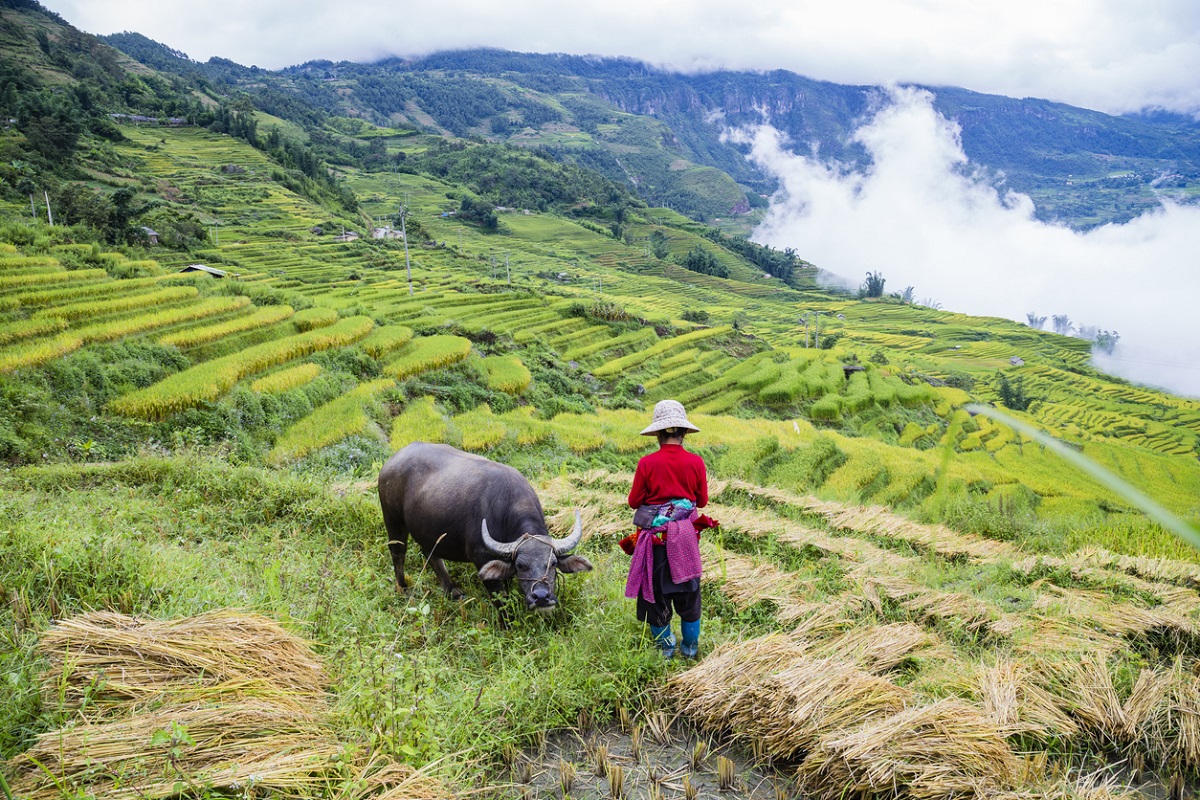Vietnam Moves To Combat Climate Change and Sustain Agriculture Using Genome Editing
| |
ISAAA Inc., in partnership with the United States Department of Agriculture Foreign Agricultural Service Hanoi (USDA FAS Hanoi), and the Vietnam Agricultural Genetics Institute organized the 2022 Biotech Outreach Webinar Series for Vietnam. The series was intended for invited members of the Ministry of Agriculture and Rural Development, Ministry of Natural Resources and Environment, scientists, media, and members of the academe. The three webinars held in July, August, and September 2022 discussed the global and national updates on genome editing for crops, the application of genome editing to mitigate climate change, and the current advances in animal biotechnology. This article collectively summarizes some key points discussed during the open fora of the webinars.

Vietnam’s Actions Towards Climate Change Mitigation
During the 2021 United Nations Climate Change Conference (COP 26), Vietnam announced its goal to reach net zero emissions by 2050. It also joined the Global Methane Pledge to reduce methane emissions by 30% between the years 2020 and 2030. These goals prompted government officials and scientists to act toward taking better care of the environment without forgoing agricultural productivity. Vietnam aims to gradually transition from conventional farming to ecological farming and the country sees adopting biotechnology as one way to combat climate change while increasing agricultural production. This can be done through the selection and breeding of new varieties that are resistant to various climate stresses that can also help in the conversion of agricultural byproducts into good waste. If farmers will be able to plant biotech crops with favorable traits and high yield as opposed to planting conventional crops with limited yield, they will be able to receive the full technical and financial benefits of what they plant without having to bear the burden of the transition.
It was also recommended for farmers to receive incentives if they choose to adopt biotech crops. Farmers are sometimes reluctant to adopt them because it takes time to fully realize the benefits of planting biotech crops. The successful transition will only come after the farmers are ensured of their yield and profit. Thus, having a credit system, like carbon credits, for farmers to practice mitigation is very important. If successful, this initiative can lead to decreasing median emissions from rice production for example, which can contribute to climate change mitigation.

Developing Climate-smart Crops and Animals
One challenge discussed during the webinars was determining the desired trait to incorporate in the selective breeding process, and how to incorporate it into the crop or animal. Researchers need access to the latest scientific advances to do further research with the aid of investments from international organizations, and from the Vietnamese government for resources, funds, and capacity building. Fortunately, institutions in Vietnam are currently studying the application of genome editing technology in plant and animal breeding, and are collaborating with international organizations to gain as much technological applications and experiences as they can to conduct biotech research.
Vietnamese scientists are cautious in selecting traits of interests for their research. These traits should not just be favorable to producers but to consumers and the environment as well. An example is heat tolerance, wherein animals like cattle can become suited for temperate climate. In turn, they will be more comfortable and more productive to make milk. Moreover, consumers are also interested if the products they buy are good for the environment and if the animals are happy and healthy.
Vietnam has the local capability and capacity to use biotechnology in scientific research. It is important to use locally sourced technology that can be adapted on endemic animals and plants of Vietnam and focus on the traits and products that Vietnamese consumers want. However, scientists cannot simply impose their research in the market if there is no demand for it. To address this, it is recommended that the government intervene and encourage the use of biotechnology in breeding programs, particularly in animals. This will also aid the country’s target goal of linking Vietnamese scientific research with the enterprises by the year 2045 to create better and practical products. If this proposal becomes a realization, enterprises in the country may become more interested in investing in local technologies instead of importing them from other countries.

Updating Regulatory Policies and Framework
The Ministry of Natural Resources and Environment and Ministry of Agriculture and Rural Development have expressed support for genome editing technology and for scientists who conduct research about it. But the full potentials of the technology cannot be fully explored without an updated regulatory framework. Vietnam needs to update its regulatory framework to accommodate gene editing technology in plants and animals and the products they derive. The framework should also require proper and meticulous documentation during the technology development and experimental phases which will be submitted to the evaluators to review the origin of the changes made then determine the technology used to modify the product.
Increasing Consumer Awareness
It is important to increase public awareness on what the scientists and government officials are doing to improve agriculture and the environmental situation in Vietnam. If the public does not have a good understanding of the benefits of modern biotechnology, it will be difficult to market or promote its products to the farmers and consumers. Hence, information campaigns to promote awareness of crop biotechnology for climate change mitigation and the safety of plant and animal products derived from genome editing should also be prioritized by technology developers with the help of government officials.
For further readings, please see:
- Experts Highlight Gene Editing Potentials for Vietnam’s Agri Sector
- Vietnamese Government Push for Agbiotechnology to Help Mitigate Climate Change Effects
- Vietnam’s Animal Biotech Research Capability To Support Gov’t’s Agricultural and Environmental Sustainability Goals
| Newer Post | Archive | Older Post |
Science Speaks is ISAAA Inc.'s official blog. Weekly blog articles, authored by ISAAA writers, partners, and invited contributors, aim to help share, disseminate, and promote scientific knowledge and its vital role in achieving global agricultural sustainability and development. Your support to Science Speaks will help us achieve this goal. You can help us by donating as little as $10.

